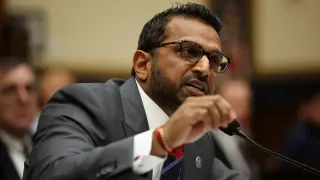February 6, 2015
Oakland Looks to Address Racial Divide
Kilian Melloy READ TIME: 5 MIN.
As Black Lives Matter demonstrations continue throughout the country, the city of Oakland is working on policies to address issues raised by the movement.
Recently, City Council President Lynette Gibson McElhaney hosted a special meeting of the council. She called for the meeting as a way to discuss racial inequality within the economic and criminal justice systems, disparities in Oakland Police Department stops and arrests, the school to prison pipeline, and other issues raised by the Black Lives Matter movement.
"We must begin the critical examination of Oakland's own practices so we can be an example to the rest of the country about how to get it right," McElhaney said at the January 24 meeting.
Oakland residents filled the City Council chambers for the Saturday meeting, and many gave personal testimony.
"If we are to take them seriously, Saturday needs to be followed up with movement of some kind, with action," Cat Brooks, co-chair of the Onyx organizing committee, said after the forum.
On February 2, McElhaney held a follow up meeting. There, community organizers who had helped plan the agenda for the first session came together to review what was said at the meeting and discuss next steps.
All of this could lead to local legislation.
"We are currently exploring a number of policies, procedures, and funding mechanisms to identify a package that can encourage the best results for our community," said new Councilman Abel Guillen, who identifies as two-spirit. "I've already started soliciting recommendations from the public on what those items might look like."
One proposal from Councilwoman Desley Brooks: a city Department of Race and Equity. The department, Brooks said, would "look at each and every department within the city, and make sure that they look at everything from a race lens and an equity lens to ensure that all of our citizens have a meaningful opportunity to engage."
The Department of Race and Equity item was heard before the council's Rules and Legislation Committee January 29. It was rescheduled to the Finance and Management Committee, which will consider funding aspects of the proposal February 24.
Many of those who spoke at the January 24 meeting said changing city funding priorities is essential for real change.
Robbie Clark, an organizer with Causa Justa: Just Cause, was a panelist at the meeting.
Clark said the City Council should "make a commitment that when they have their budget discussions this summer, that they will consider limiting the amount of general fund money that goes to the police."
Oakland currently spends 60 percent of its general fund on police and fire costs. Many speakers suggested reinvesting some of that money into tenant protections, jobs, and education.
As an immediate step, some speakers recommended dropping the charges against the Black Friday 14, a group who locked themselves to a BART train on the busy shopping day as part of a day of action to "disrupt business as usual" and bring attention to state violence against African Americans.
After an outpouring of support for the Black Friday 14 at last month's BART board meeting, lesbian BART board director Rebecca Saltzman said that she would soon introduce a resolution urging that the charges be dropped. During the January 24 city council meeting, Brooks asked elected officials present to take a position in support of dropping the charges. BART board director Robert Raburn came to the microphone to respond, saying the decision was out of his hands.
"It's up to the district attorney," he said. "I can't speak for the full board, but I support removing the penalties, and the charges do need to go through the court of law, not through elected officials."
Alameda County District Attorney Nancy O'Malley did not attend the January 24 meeting. O'Malley did not respond to requests for comment.
Other Ideas
Other ideas suggested by the public at the forum included hiring more police officers who live in Oakland and transparent and thorough investigations by third parties following officer-involved shootings.
One panelist at the forum, Stanford psychology professor Benoit Monin, provided numbers that illustrated the need for more local hire of police.
Monin is part of a study of Oakland police practices, contracted by OPD as part of its negotiated settlement agreement. The research team, led by professor Jennifer Eberhardt, is doing a close study of police stops between April 2013 and April 2014.
The study found that of 511 Oakland police officers who made self-initiated stops over that time period, only 37 live in Oakland.
Lesbian Councilwoman Rebecca Kaplan has since proposed a resolution to create a policy goal of 50 percent local hire in OPD. That item will next be heard by the public safety committee April 28.
Eberhardt's study also found that African Americans make up 74 percent of pedestrian stops - those who were stopped by police while walking down the street - in that time period, and 60 percent of stops overall, despite the fact that only 28 percent of the population of Oakland is African American.
Many speakers at the meeting also called for an end to paid leave for police officers who kill.
Oakland Police Chief Sean Whent, a panelist at the meeting, said that putting police officers who use lethal force on unpaid leave isn't feasible.
The Police Officers Bill of Rights, a federal set of protections for police, prohibits unpaid leave for police who use lethal force because it would be considered a punitive action, he explained.
This would violate the right to due process that the Police Officers Bill of Rights guarantees.
Clark's ideas for next steps include taking the discussion out of City Hall and into communities.
"There were a number of pastors there" at the January 24 meeting, Clark said. "It might make sense for us to be having some of these conversations in the churches."
Clark would also like to see the end of the nuisance eviction ordinance, a city policy that allows landlords to bypass due process when evicting tenants who fall into certain "nuisance" categories. Recently, the city added tenants accused of sex work-related charges.
"We know trans people of color are disproportionately targeted and arrested in relation to sex work, when that's not what they do," Clark said.
In general, Clark said, "it's good that city officials want to talk to community organizers."
But they're wary that, without a specific plan of action, the City Council process could be detrimental to the movement.
"I don't want those of us who are out in the community doing work to be caught up in meetings with elected officials without anything really happening," Clark said.
The Oakland City Council could create policy that leads the country in responding to the Black Lives Matter movement. But as it continues to address the issues in meetings and committees, Black Lives Matter demonstrations will also continue on the streets.
"We're not going to stop," Clark said.






